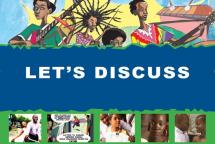Let’s Discuss
This is a manual for a kit which includes a CD, DVD and guide to support group discussion among Tanzanian youth and/or adults around HIV and AIDS.
Specifically, it focuses on issues related to adult-child communication, cross-generational sex, stigma and discrimination, and faithfulness. The kit provides a collection of songs, dramas, discussion questions, and participatory activities that encourage young people and adults to discuss HIV and AIDS and identify ways to protect themselves and their communities against infection. Although the guide can be used as a stand-alone tool, the materials from the larger kit are meant to make discussions more lively and entertaining. Each item in the kit is designed to promote personal reflection and group discussion on how to apply what is learned in the participants’ own lives.
This package or materials is meant to compliment existing life skills and group education interventions and can be integrated into new or ongoing activities. The kit covers the topics of: 1. alcohol misuse and risk-taking, 2. adult-child communication, 3. cross-generational sex, 4. stigma and discrimination, and 5. faithfulness.
Source: Johns Hopkins University Center for Communication Programs, FHI 360, ICF International, WellShare International
Date of Publication: March 25, 2019
SIMILIAR RESOURCES
Tools
Examples
- Love, Children and Family Planning: Seven Discussion Guides for Christian Small Groups
- Community Communication MNCH e-Manual: Participatory Health Promotion Sessions
- Men's Reproductive Health Curriculum
- Family Planning Discussion Topics for Voluntary Counseling and Testing
- Let's Talk about COVID-19 Online Course
- Antiretroviral Therapy for HIV Infection in Infants and Children: Recommendations for a Public Health Approach
- Positive Connections: Leading Information and Support Groups for Adolescents Living with HIV
- Adolescent HIV Testing, Counselling and Care
- Joint WHO/ILO Guidelines on Post-Exposure Prophylaxis (PEP) to Prevent HIV Infection
- Adolescents Living with HIV (ALHIV) Toolkit

